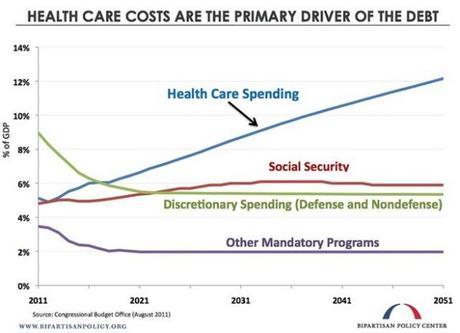
Bipartisan Policy Center
Ezra Klein spells out the real reason we ought to be worried about long term deficits: healthcare spending will soon crowd out all other types of spending, particularly investment spending like education and research.
The key insight behind this theory is that some forms of government spending rise automatically and rapidly, and are very politically difficult to cut, while other forms of government spending need congressional approval every single year and have few constituencies to protect them. In the first category are Medicare and Medicaid and Social Security, all of which are projected to consume much more of the federal budget in the coming years. In the second category are things like education funding, research and development, stimulus, infrastructure investment, and even the military. And the fear is the first category is squeezing out the second category…
…Just as interest rates posed a threat to the economy in the 1990s, insufficient government spending on research and development, infrastructure and education poses a threat going forward. Many of the technologies that drive today’s economy, from antibiotics to GPS to biotech to shale gas extraction to the Internet to jet engines, relied on federal funding to get started. And there’s little doubt that it’ll be difficult to build a 21st century economy atop a 20th century physical — not to mention digital and educational — infrastructure.
This is a recipe for stagnation. All taxation transfers wealth from one party to another. We are now transferring wealth to the elderly at the expense of the future. As I have written before, the baby boomers have voted in more and more benefits for themselves while voting to lower their taxes over and over. Its not their fault, though. They just expect the benefits that people in every other advanced nation receives. They expect healthcare and they expect to retire with dignity.
Because we refuse to look to other nations as examples, we have created a healthcare system that spends twice as much per person as the next nation, with much poorer results. At the very, very minimum, we ought to expect to pay half as much for better healthcare. Many nations spend far less than that for better outcomes.
A nation that spends all its money on inferior healthcare while failing to invest in the future is going to fall behind. Its time our leaders start working together to fix this, but as Klein notes:
But the politics are tough. “When you invest in your future growth, you’re often investing in a group of people who are children and, by definition lack political power,” says Gene Sperling, director of the National Economic Council. “Or you’re investing in things that are precisely what you want government to do because no particular person captures the benefit but it instead benefits everyone.”
By contrast, when you try to raise taxes or cut back on health or retirement spending at a moment when health-care costs are rising and the population is aging, very specific people with very powerful lobbies feel the loss, and fight it.
